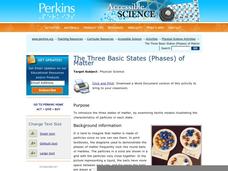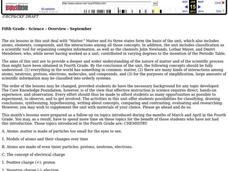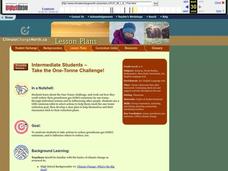Perkins School for the Blind
The Three Basic States (Phases) of Matter
There are three basic states of matter: Solid, liquid, and gas. Help your learners with visual impairments to understand the chemical nature of each state of matter with tactile elements. Marbles are used to model the particles in each...
Center for Learning in Action
Water—Changing States (Part 1)
Here is part one of a two-part lesson in which scholars investigate the changing states of water—liquid, solid, and gas. With grand conversation and up to three demonstrations, learners make predictions about what they think will happen...
TLS Books
Jupiter
Young astronomers read an informational text on the gas giant, Jupiter. Then they answer four multiple choice questions based on what they read.
Beyond Benign
Daphnia Bioassay LD50
De-icing materials may have a harmful effect on our environment; have your class perform an experiment to test the nature of these effects. Scholars monitor the survival rate of a sample of daphnia as the concentration of a de-icing...
University of Colorado
Can Photosynthesis Occur at Saturn?
In the 19th activity of 22, learners determine if distance from a light source affects photosynthesis. Participants capture oxygen in straws and find that the amount of water the gas displaces is proportional to the rate of photosynthesis.
Massachusetts Institute of Technology
Auroras
Learn the science behind one of the most beautiful acts of nature. A comprehensive lesson explores the causes and characteristics of auroras. The instruction also explains the differences among auroras and what the differences indicate...
Glynn County School System
Cosmology
The past, the present, and the future ... there's so much to discover about the galaxy. Scholars learn about the creation of the universe, its current structure, and how it is changing. The PowerPoint presentation begins with a...
Chymist
Landfills and Recycling
Examine the nature of landfills through experimentation. Scholars build miniature landfills and monitor changes over a six-week period. Observations allow individuals to draw conclusions about the different types of trash and their...
Curated OER
Modeling Oil and Gas Reservoirs
Students investigate energy by researching how oil reservoirs work. In this fossil fuels lesson, students conduct an experiment using a half full bottle of water, corn oil and oxygen, recording their data as the elements are mixed...
Curated OER
State of Matter - Atoms
Students examine and discuss how atoms change from solid to liquid to gas. They inflate a balloon by melting ice that converts to steam, and discuss the results.
Curated OER
Solids, Liquids, and Gases
Students explore the three main forms of matter: solid, liquid, and gas. They examine concrete examples of each, using their five senses and "experimenting" to find differences in them. They find pictures of each, cut them out and past...
Curated OER
Reservoirs and Production
Students complete activities for a lesson about reservoirs and production. For this geology lesson, students complete a 7 page packet of activities to explore porosity, permeability, and rock properties.
Curated OER
Make a difference
Young scholars figure out math equations based on the recycling of cans and gas consumption. In this recycling lesson plan, students have challenge cards that ask them challenge questions on how to save gas and what a difference...
Curated OER
Matter
Fifth graders investigate the nature of matter and of the scientific processes associated with them in this series of lessons.
Curated OER
Costs of Living
Students consider the effects of rising oil and natural gas prices on family spending and saving habits. They design a board game intended to help people save.
Curated OER
What A Gas!
Students study various aspects of air. In this science lesson plan, students discover that air occupies space, understand the visual effects of air, and explain how air exerts force.
Curated OER
The Nature of Chemical Change: Acting Out an Example
Students identify the signs that a chemical reaction took place. In this chemistry lesson plan, students role play the movement of different molecules of matter. They classify matter according to their properties.
Curated OER
Take the One-Tonne Challenge!
Students investigate the One-Tonne challenge, and work out how they could reduce their greenhouse gas (GHG) emissions by one tonne, through individual actions and by influencing other people.
Curated OER
Renewable vs. Non-Renewable Resources
Here's a fine lesson plan on renewable and non-renewable sources of energy for your 5th graders. In it, learners list a number of natural resources on the board, then try to sort the resources into appropriate categories. This helps them...
Curated OER
It's A Gas
Students build an organic waste methane generator and learn by running a scientific experiment to see what happens when people alter nature's way of recycling.
Curated OER
Our Earth: Storehouse of Natural Resources
Students listen to an explanation of the science of the mining industry and create a geological map of Africa. They discuss the uses of minerals and resources and research a natural mineral resource in their part of the world.
Curated OER
Gas Properities Definitions
Young scholars, after reading the Web page Gas Properties Definitions, complete the activity to demonstrate an understanding of the properties of gases.
Curated OER
Activity #9 Extending Oil Well Production
Middle schoolers simulate methods used to extend the effective life of an oil well by extracting less available oil. They identify techniques which can be used and evaluate their effectiveness. Pupils are introduced to rock size and...
Curated OER
Products Made from Petroleum
Students research products made from petroleum. For this transportation lesson students try to find products other than fuel, made from petroleum. They look for the most unusual or surprising products and describe the history and...
Other popular searches
- Coal Petroleum Natural Gas
- Natural Gas Experiments
- Oil vs. Natural Gas
- Natural Gas Energy
- Natural Gas Safety World
- Natural Gas and Oxygen
- Natural Gas Activities
- Natural Gas Resources
- Oil vs Natural Gas
- Liquefied Natural Gas
- Consumption of Natural Gas
- Natural Gas Drilling























